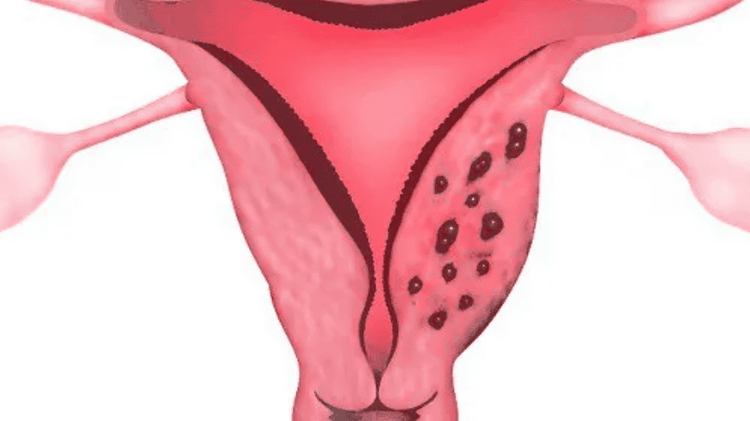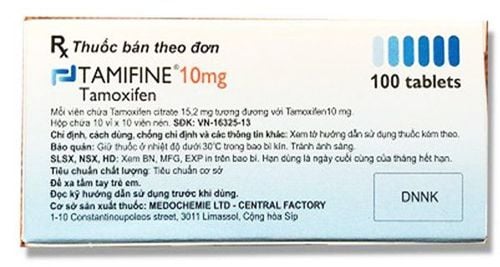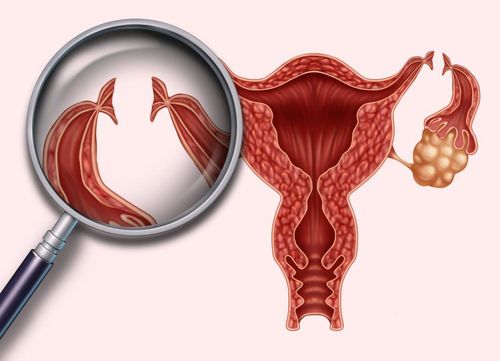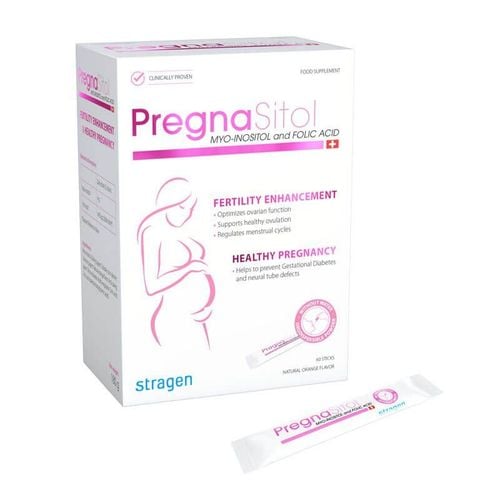This is an automatically translated article.
The article is professionally consulted by Master, Doctor Trinh Thi Thanh Huyen - Department of Obstetrics and Gynecology - Vinmec Hai Phong International General Hospital.
Endometriosis is considered one of the most common gynecological diseases today. Although the disease is not dangerous, it affects the ability to have children in women, especially women of childbearing age. The endometriosis treatment used will depend in part on whether you want to become pregnant in the future.
1. What is endometriosis?
Endometriosis occurs when the tissue that lines the inside of your uterus (the endometrium) grows outside of your uterus.This tissue stays the same throughout your menstrual cycle and will thicken, break down, and bleed. During the menstrual cycle, the endometrial layer sheds and flows out with the menstrual blood. However, for patients with endometriosis, endometrial debris flows back into the fallopian tubes or ovaries. They can become blocked in some part of the uterus, causing inflammation and bleeding, the surrounding area becomes irritated and swollen, and scar tissue can form.
Endometriosis can cause a number of other problems, such as:
Blocked fallopian tubes and infertility (can't get pregnant) Blood accumulated in the ovaries can form cysts Bowel and bladder problems There is no cure for endometriosis, and current treatment is aimed at reducing the effects of symptoms.
If your pain is not too severe, you can take pain relievers. Your doctor may recommend ibuprofen (Advil or Motrin) or naproxen (Aleve).

Lạc nội mạc tử cung là một trong những bệnh lý phụ khoa thường gặp
2. How is endometriosis treated?
The goal of endometriosis treatment is to control pain and prevent endometriosis from getting worse. The treatment you and your doctor choose will depend on the severity of your symptoms and whether you want to become pregnant in the future.2.1. Medicines Medications prescribed to treat endometriosis include:
Birth control pills and other birth control methods: birth control pills, patches and vaginal rings to help control hormones that cause tissue buildup endometrium during the menstrual cycle Progestine treatment: such as an intrauterine device (IUD), injections, implants, or the use of medications to slow or stop the growth of endometriosis Hormone analogues Gonadotropin-releasing hormone to block certain hormones and slow or stop the growth of endometriosis Other medications your doctor may prescribe may include aromatase inhibitors (AIs) to reduce the amount of estrogen in the body. your body's effects vary from person to person, but it usually takes about 2 to 3 months for symptoms to get better and for your body to get used to a new medicine.
Different medicines can have different side effects, but most will go away once treatment is stopped and your period returns.
Side effects you may experience while taking birth control or progestin therapy may include:
Unusual bleeding or spotting Nausea Weight gain or bloating Headache Mood swings, including Depression Hair loss With the use of GnRH-releasing hormone analogues, you may experience some side effects such as:
Hot flashes and night sweats Vaginal dryness Mood swings, including depression Headache Loss Hair Heart problems Progestin therapy, gonadotropin-releasing hormone analogues, and AI can also cause bone loss over time.

Điều trị lạc nội mạc tử cung là kiểm soát cơn đau
2.2. Surgical treatment of endometriosis With some cases of endometriosis, the doctor will appoint surgery. Surgery is usually to remove growths outside of your uterus, which can cut down on pain. However, tissue can grow and pain can sometimes return, so you may also need medication.
In more severe cases, your doctor may recommend a hysterectomy. This is surgery in which the uterus and sometimes the cervix and/or ovaries are removed.
Surgery, as with any treatment, can carry certain risks, so you should consult with your doctor to find the best treatment for you.
Certain treatments can help control symptoms of the disease and may help improve your chances of getting pregnant.
If you intend to become pregnant in the near future while being treated for endometriosis, you should opt for a medication method. Once you stop the pill and your period returns, you may have a better chance of getting pregnant.
If you are trying to get pregnant and can't, surgery to remove endometrial growths while keeping your uterus and ovaries can increase your chances of success. It's important to remember that if you have surgery to remove your uterus (hysterectomy) and/or ovaries, you won't be able to get pregnant afterward.
3. Make a treatment plan
You and your doctor can create a plan that includes what treatment is right for you and when to start or stop treatment. Not every medicine will work for everyone so it can take some time to find the best treatment.Record your symptoms in a diary. Don't ignore symptoms, even if they seem unrelated to endometriosis. Be sure to record when your pain occurs and describe it clearly.
Don't hesitate to speak up about your pain. Describe how pain affects your life. How severe is the pain? Does it change from month to month?
You can ask your doctor a few questions, which will help you and your doctor come up with the best treatment for you, such as:
What treatments are available and how they work What is their sub? When should I start treatment? How long will it take after treatment to start working? How long do I need treatment? Will this affect my chances of getting pregnant? Will I need surgery? Will my endometriosis get better or go away as I go through menopause? Are there lifestyle changes I should make? The goal of endometriosis treatment is to control pain and prevent endometriosis from getting worse. The treatment you and your doctor choose will depend on the severity of your symptoms and whether you want to get pregnant someday.

Xây dựng lối sống lành mạnh
Basic gynecological examination and screening package for female customers, has no age limit and may have the following symptoms:
Abnormal vaginal bleeding Having menstrual problems: irregular menstrual cycle, irregular menstrual cycle Irregular vaginal discharge (smell, different color) Vaginal pain and itching Female clients have several risk factors such as poor personal hygiene, Unsafe sex, abortion,... Female customers have other symptoms such as: Abnormal vaginal discharge, itching, pain in the private area, abnormal vaginal bleeding. Master. Trinh Thi Thanh Huyen is highly trained in obstetric ultrasound, laparoscopic surgery and hysteroscopy at the National Hospital of Obstetrics and Gynecology and has more than 13 years of experience working at Hai Phong Obstetrics and Gynecology Hospital.
Currently, the doctor is an Obstetrician and Gynecologist at Vinmec Hai Phong International General Hospital
Please dial HOTLINE for more information or register for an appointment HERE. Download MyVinmec app to make appointments faster and to manage your bookings easily.
Article referenced source: Webmd.com












